Herzlich willkommen im Forschungsbereich Religiöse Gemeinschaften und nachhaltige Entwicklung!
Science to Public: Making Research Accessible to the Public
Science thrives on exchange – not only within academic circles but also with society at large. A prime example of this is the German-language podcast “Religionen” by Deutschlandfunk Kultur, which provides weekly insights into religious life in Germany, Europe, and worldwide. In expert discussions, topics such as religious change, ethical responsibility, social cohesion, and issues arising from power claims and conflicts on both individual and collective levels are critically examined.
In two recent episodes, members of our research program were interviewed. On October 26, 2025, the podcast covered the prosperity gospel in African Initiated Churches. Philipp Öhlmann explained how these churches act as development actors and what role they play for the economy and society.
Freikirchen in Afrika - Göttlicher Segen im Hier und Jetzt
In another episode, which aired on December 7, 2025, Almut-Barbara Renger (Religious Studies / Religionswissenschaft) explored why Buddhism is often used as a “spiritual quarry” and how European societies decontextualize elements of Buddhist practice – affecting the understanding of religion.
Warum der Buddhismus oft als spiritueller Steinbruch genutzt wird
Both episodes are exemplary cases of how podcasts and journalistic formats can present research findings and make them accessible to a wide audience. Science is thus not only explained but also socially effective – the core idea of Science to Public.
Celebrating the Life and Legacy of Professor Wilhelm Gräb
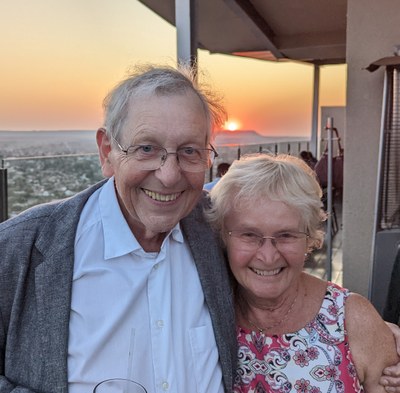
Dear Colleagues and Friends,
It is with great sadness that we are writing this note to inform you that Professor Wilhelm Gräb, co-leader of our Research Programme, has passed on. After fighting cancer for nearly three years, his life on earth ended in Berlin on 23 January 2023.
Wilhelm Gräb was one of Germany’s leading Practical Theologians. He was co-founder and head of the Research Programme on Religious Communities and Sustainable Development at Humboldt-Universität zu Berlin, Senior Advisor at the Faculty of Theology and Principal Investigator in the International Research Training Group “Transformative Religion” as well as Extraordinary Professor at Stellenbosch University.
Professor Gräb was an exceptional scholar, committed to expanding the boundaries of knowledge through research and critical engagement. His work and advice have formed and inspired generations of students and scholars and his manifold contributions to theology and empirical research in religion will continue to inspire generations to come.
Moreover, Wilhelm Gräb was an exceptional person, appreciated for his kindness, humility and Menschlichkeit. His creativity and energy, his sharp and constructive criticism, his joyfulness and laughs and his combination of pragmatism and visionary leadership will be dearly missed.
We would like to invite you to join us in remembrance and prayers, comforted in all sadness by knowing that Wilhelm Gräb is now in a better place. In the thankfulness for Wilhelm Gräb’s life and for having known him and journeyed with him, we would also like to invite you to join us in celebrating his life as an extraordinary scholar, colleague, mentor and friend.
Yours sincerely,
Philipp Öhlmann, Marie-Luise Frost, Madlen Geidel, Sura Mahmood, Nora Monzer, Nina van der Puije, Almut-Barbara Renger, Raphael Sartorius, Daniel Schumacher, Ekkardt Sonntag and Juliane Stork on behalf of the Research Programme on Religious Communities and Sustainable Development
Bild: Philipp Öhlmann
Iraqi Delegation Visit
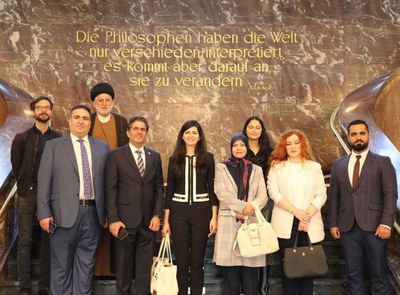
The Research Programme on Religious Communities and Sustainable Development invited an Iraqi delegation of academics, religious actors and religious minoritiy activists headed by Dr. Saad Salloum to visit Humboldt University's main campus. The guests were taken on a tour to learn more about the history of the university. The delegation and the Research Programme discussed different ways for further collaboration and explored exchange opportunities for Iraqi students.
The delegation members were:
Dr. Muhannad Jamal al-Din, professor of Islamic sciences at the University of Kufa
Dr. Mujtaba Al-Helou, Assistant Professor of English Literature at Karbala University
Dr. Mona Hassan, Professor of Comparative Literature at the University of Kufa
Dr. Khaled Abdel-Ilah, Dean of the College of Political Science at Al-Mustansiriya University
Dr. Saad Salloum, President of the Masarat Foundation and founder of the Institute for Religious Diversity Studies
Mr. Ali Zwain, head of the media department at the European Foundation for Interfaith Understanding
Ms. Hilal Alo, activist for Yezidis and minorities' rights.
The Research Programme RCSD appreciates the support of the International Office of Humboldt University in facilitating this tour and is thankful for their time and flexibility.
Guest Lecture on “Religion and Development in West Africa”
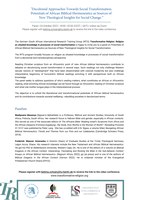 A Guest Lecture on "Religion and Development in West Africa" was held by Rev. Dr. Frederick Mawusi Amevenku, Director of Graduate Studies from the RCSD Partner University - Trinity Theological Seminary, Legon Accra, Ghana.
A Guest Lecture on "Religion and Development in West Africa" was held by Rev. Dr. Frederick Mawusi Amevenku, Director of Graduate Studies from the RCSD Partner University - Trinity Theological Seminary, Legon Accra, Ghana.
In the framework the IRTG Programme Transformative Religion Dr. Amevenku talked on how Mother Tongue Biblical Hermeneutics as indigenous cultural resource can contribute to social transformation. Together with Professor Madipoane Masenya, Biblical and Ancient Studies, University of South Africa, Pretoria the speakers discussed the liberation and transformational potentials of African biblical hermeneutics for societal wellbeing.
Video Playlist: Lecture Series on Religion and Ecology
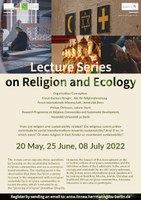 How are religion and sustainability related? Do religious communities contribute to social transformations towards sustainability? And if so, in which ways? Or does religion in fact hinder or counteract sustainability?
How are religion and sustainability related? Do religious communities contribute to social transformations towards sustainability? And if so, in which ways? Or does religion in fact hinder or counteract sustainability?
The lecture series explored these questions by focusing on the relationship between religious communities and socio-ecological transformations. We are delighted to announce that we just published the presentations on our YouTube channel. We would like to express our gratitude to the lecturers for their thought-provoking presentations.
Find the „Lecture Series“ Playlist here.
Konsultationsprozesses „Religion und Gewalt“ 14.10 – 15.10.2022
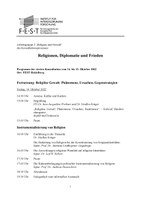 Nora Monzer hielt im Rahmen des interreligiösen und interdisziplinären Konsultationsprozesses „Religion, Diplomatie und Frieden“ einen Impulsvortrag zum Thema „Praxisbeispiele politischer Instrumentalisierung von Religion an der Forschungsstätte der Evangelischen Studiengemeinschaft in Heidelberg halten.
Nora Monzer hielt im Rahmen des interreligiösen und interdisziplinären Konsultationsprozesses „Religion, Diplomatie und Frieden“ einen Impulsvortrag zum Thema „Praxisbeispiele politischer Instrumentalisierung von Religion an der Forschungsstätte der Evangelischen Studiengemeinschaft in Heidelberg halten.
Newly Published: 'I Got the Call – Not Him' Founding an African Initiated Church as an Act of Emancipation
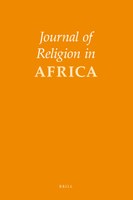 Marie-Luise Frost’s newest article “'I Got the Call – Not Him' Founding an African Initiated Church as an Act of Emancipation” was published in the Journal of Religion in Africa.
Marie-Luise Frost’s newest article “'I Got the Call – Not Him' Founding an African Initiated Church as an Act of Emancipation” was published in the Journal of Religion in Africa.
This paper examines how the call to found their own churches has allowed and enabled women to challenge social and doctrinal norms and thus to emancipate themselves from traditional gender roles. It focuses on African Initiated Churches including both African Independent and Pentecostal Charismatic Churches.
Click here to read the article.
Newly Published: South African Youth and the Labor Market
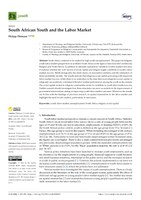
Philipp Öhlmann’s newest article “South African Youth and the Labor Market” was published in the Open Access Journal Youth.
South Africa continues to be marked by high youth unemployment. This paper investigates youth labor market perspectives in northern South Africa in the light of data from the Livelihoods, Religion and Youth Survey. The results indicate that the social capital created in religious communities seems to contribute to youth labor market success.
Click here to read the article.
Call for Application: Consultancy for an inter-faith textbook project on integral ecology
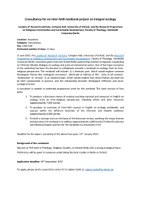 Laudato Si’ Research Institute, Campion Hall, University of Oxford, and the Research Programme on Religious Communities and Sustainable Development, Faculty of Theology, Humboldt University Berlin
Laudato Si’ Research Institute, Campion Hall, University of Oxford, and the Research Programme on Religious Communities and Sustainable Development, Faculty of Theology, Humboldt University Berlin
Location: Anywhere
Category: Consultancy
Fee: 1190 GBP
Estimated number of days: 12 days
Deadline for the report, consisting of the above four parts: 15th January 2023.
Background of the consultant:
Masters or PhD level in Theology, Religious Studies, or related fields with a strong ecological focus.
Preference will be given to someone undertaking doctoral studies in Berlin or Oxford.
Application deadline: 30th September 2022
To apply, please send a cover letter and a CV to Juliane Stork at: juliane.stork@hu-berlin.de
Further information can be found here.
Newly Published: International Handbook on Creation Care and Eco-Diakonia

The chapters reflect on eco-theology, protection of biodiversity, ecological transformation, and ethics of sustainability through Southern lenses. The volume presents fascinating diverse insights on the “greening of religion”.
The link to the handbook can be found here.
Newly Published: The State of the Evidence in Religions and Development
The Joint Learning Initiative on Faith and Local Communities published “The State of the Evidence in Religions and Development”. Philipp Öhlmann contributed the chapter on “Religions and the Environment” (jointly with Ignatius Swart) and Susanne Trotta contributed the chapter “Religion and Forced Migration” (jointly with Elena Fiddia-Qasmiyeh). The report aims to highlight recent evidence in the field of religion and development. It seeks to provide insights into major debates and themes.
The link to the publication can be found here.
Call for Applications: The IN//RCSD Master Class "Development Paradigms in Conversation - Master Class on Religious Communities and Sustainable Development" | Deadline 15 June 2022
In-person Class. 08 August - 19 August 2022 - University of KwaZulu-Natal, South Africa (Pietermaritzburg Campus)
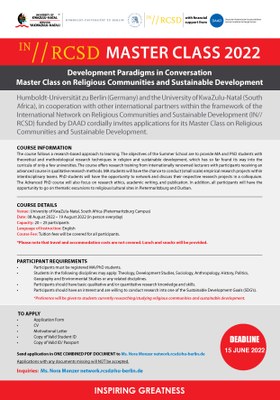
The application form can be found here.
We are very delighted to announce the application for the IN//RCSD Master Class 2022 is now open! Kindly find the overview of the application here.
The objectives are to provide MA and PhD students with theoretical and methodological research techniques in religion and sustainable development, which has so far found its way into the curricula of only a few universities. The course offers research training from internationally renowned lecturers with participants receiving an advanced course in qualitative research methods.
Further information can be found here.
Send application in ONE COMBINED PDF DOCUMENT to Ms Nora Monzer network.rcsd@hu-berlin.de
Invitation: Lecture Series on Religion and Ecology | 20 May, 25 June, 08 July 2022
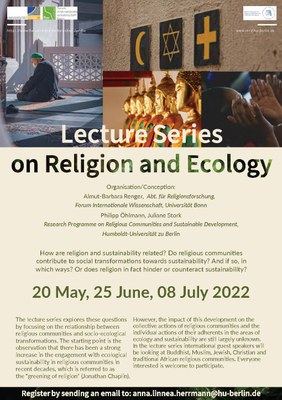
Kindly find the information here.
We are very delighted to invite you to participate in the Lecture Series on Religion and Ecology.
How are religion and sustainability related? Do religious communities contribute to social transformations towards sustainability? And if so, in which ways? Or does religion in fact hinder or counteract sustainability?
The lecture series explores these questions by focusing on the relationship between religious communities and socio-ecological transformations. Kindly register to Ms Anna Linnéa Herrmann: anna.linnea.herrmann@hu-berlin.de
Philipp Öhlmann and International Partnership on Religion and Sustainable Development (PaRD) on "Prayers and Policy": How Governments and Religious Actors Can Meet Sustainable Development Goals Together

Hier finden Sie den vollständigen Artikel.
Recent studies show that insecurity increases religiosity in societies; simply put, religion plays a more significant role in places where development cooperation is relevant. The reluctance to formalise government cooperation with religious organisations has political, social, and historical validity. Yet, as Philipp Öhlmann points out, “we need to show people the relevance of religion independent of their own attitude or disposition towards it.”
Newsletter RGNE 02/2021
Hier finden Sie die Browser-Version unseres aktuellen Newsletters.
Er enthält neben Neuigkeiten aus dem Forschungsbereich Hinweise auf Veröffentlichungen, Veranstaltungen und geplante Aktivitäten.
Podiumsdiskussion mit Philipp Öhlmann, Katharina Pyschny, Mona Feise-Nasr und Wolfram Stierle
"Glauben & Wissen. Theologiegespräche an der HU": Nachhaltigkeit
Hier finden Sie die vollständige Videoaufzeichnung der Podiumsdiskussion.
Der Klimawandel und seine ökologischen und sozialen Folgen, die Ausbeutung der natürlichen Ressourcen und das Aussterben von Tier- und Pflanzenarten – all dies hat die Menschheit zu verantworten. Welche Bedeutung haben in diesem Zusammenhang Religionen? Ist der biblische Herrschaftsauftrag wirklich im Sinne einer Ausbeutung der Schöpfung durch den Menschen zu verstehen? Welche Rolle spricht der Koran dem Menschen als „khalifa“ zu? Wann geht es um Schöpfungsbewahrung? Wie lässt sich umweltethisches Handeln theologisch begründen? Und was leisten internationale Religionsgemeinschaften für eine nachhaltigere Welt?
Radiointerview zu Religion und Nachhaltigkeit in der Sendung "Klima-Gespräche" des Deutschlandfunks mit Philipp Öhlmann.
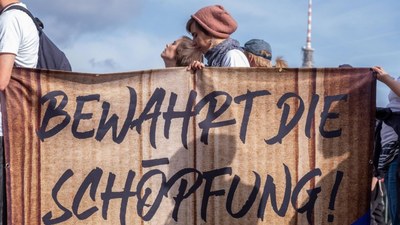 Hier finden Sie das vollständige Interview.
Hier finden Sie das vollständige Interview.
„Klimaschutz & Religion. Was die Kirchen sagen – und was sie tun“. Für diese interessante Sendung des Deutschlandfunks wurde Philipp Öhlmann interviewt. Er sprach über den Beitrag von Kirchen im Bereich des Klimaschutzes in Afrika. Besonders stellte er dabei ihre Rolle im Bezug auf nachhaltige Landwirtschaft heraus.
Wer mehr über dieses Thema erfahren möchte sowie über die Rolle, die Klimaschutz in den deutschen Kirchen spielt, den laden wir ein, den ganzen Artikel zu lesen.
Religion und Nachhaltigkeit: Interview mit Marie-Luise Frost im Nachhaltigkeitsportal Humboldts17
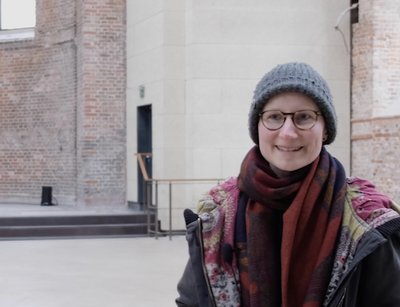 Hier finden Sie das vollständige Interview.
Hier finden Sie das vollständige Interview.
Religion verbindet Menschen, ihr Glaube bringt sie zusammen, um gemeinsam Gesellschaft zu gestalten. Dies gilt besonders in jenen Regionen der Welt, in denen religiöse Gemeinschaften die wichtigsten Institutionen vor Ort sind. Können Gemeinden dort zu einer nachhaltigen Entwicklung beitragen? Und wenn ja, welche Rolle spielen Religion und Religiosität in diesem Veränderungsprozess? Diese Fragen wollen WissenschaftlerInnen am Forschungsbereich Religiöse Gemeinschaften und nachhaltige Entwicklung (RCSD) beantworten.
Research Results and Policy Recommendations for German Development Policy:
"Potentials of Cooperation with African Initiated Churches for Sustainable Development"
Wir freuen uns, die englische Übersetzung unseres Forschungsberichts "Potenziale der Zusammenarbeit mit African Initiated Churches für Nachhaltige" zu veröffentlichen: Research Results and Policy Recommendations for German Development Policy by Philipp Öhlmann, Marie-Luise Frost and Wilhelm Gräb. Die deutsche Version finden Sie here.
Newsletter RGNE 01/2021
Hier finden Sie die Browser-Version unseres aktuellen Newsletters.
Er enthält neben Neuigkeiten aus dem Forschungsbereich Hinweise auf Veröffentlichungen, Veranstaltungen und geplante Aktivitäten.





